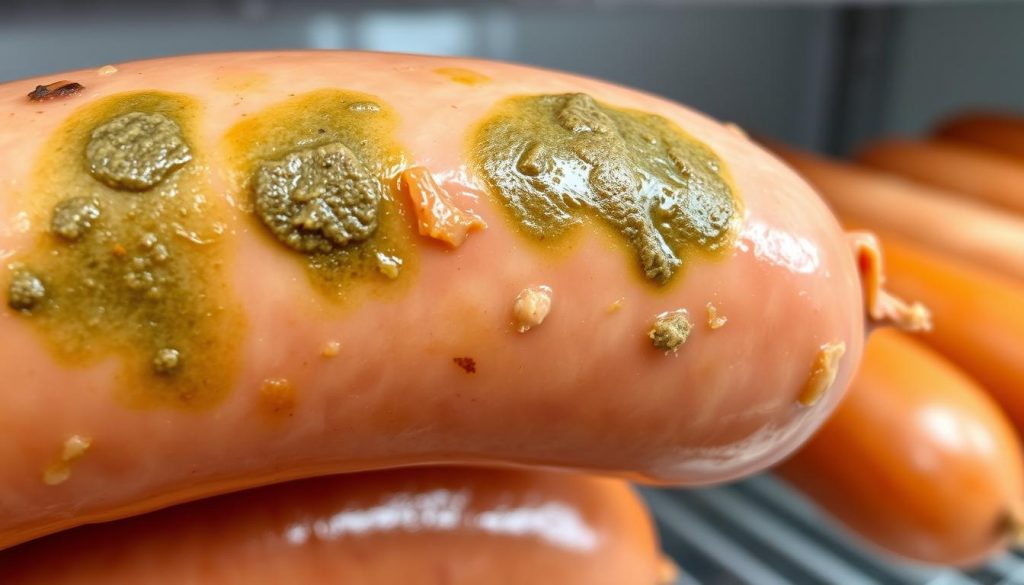Chicken sausage is a tasty and versatile protein. Knowing its shelf life is crucial for food safety. Let’s explore how to store refrigerated sausage safely.
Understanding chicken sausage shelf life prevents foodborne illness. It also helps reduce waste. Proper storage ensures both delicious and safe meals.
We’ll cover fresh and cooked sausage storage times. Factors affecting storage and tips for longer freshness will be discussed. Your next meal will be both tasty and safe!
Key Takeaways
- Proper storage extends chicken sausage shelf life
- Raw sausage lasts 1-2 days in the fridge
- Cooked sausage can be refrigerated for 3-4 days
- Temperature control is crucial for food safety
- Look for signs of spoilage before consuming
- Freezing can extend storage time significantly
Understanding Chicken Sausage Shelf Life Basics
Proper storage of chicken sausage ensures food safety and optimal flavor. Let’s explore the key aspects of storage duration and freshness.
Fresh vs Cooked Chicken Sausage Storage Times
Raw and cooked chicken sausages have different shelf lives. Fresh sausages last 1-2 days in the fridge. Cooked ones stay good for 3-4 days.
Always check the packaging for specific expiration dates. These guidelines help maintain quality and safety.
| Type | Refrigerator Storage | Freezer Storage |
|---|---|---|
| Fresh Chicken Sausage | 1-2 days | 1-2 months |
| Cooked Chicken Sausage | 3-4 days | 2-3 months |
Factors Affecting Sausage Longevity
Several factors influence how long chicken sausage stays fresh:
- Storage temperature
- Packaging integrity
- Handling practices
- Preservatives used
Proper refrigeration and airtight packaging can significantly extend storage duration. These practices help maintain quality and safety.
Signs of Fresh Chicken Sausage
Fresh chicken sausage should have a pinkish color and firm texture. The aroma should be mild, not overpowering.
If you notice off-odors, discoloration, or slimy texture, discard the sausage. Trust your senses when checking freshness.
“Always trust your senses when determining chicken sausage freshness. If something seems off, it’s better to be safe than sorry.”
How Long Does Chicken Sausage Last in the Fridge
Proper storage of chicken sausage is vital for safety and taste. Let’s explore the storage guidelines for raw and cooked sausages. These tips will help you enjoy your poultry products at their best.
Raw Chicken Sausage Storage Duration
Fresh, raw chicken sausage stays good for 1-2 days in the fridge. Keep it in its original packaging or wrap it tightly in plastic. For best quality, use raw sausages within 24 hours of buying.
Cooked Chicken Sausage Timeframes
Cooked chicken sausage lasts longer than raw. Store it in airtight containers for 3-4 days in the refrigerator. This makes it great for meal prep or quick dinners.
Pre-packaged vs Butcher-made Storage Guidelines
Storage times differ between pre-packaged and butcher-made sausages. Here’s a quick comparison:
| Sausage Type | Raw Storage Time | Cooked Storage Time |
|---|---|---|
| Pre-packaged | 1-2 days | 3-4 days |
| Butcher-made | 1 day | 2-3 days |
These timeframes are just guidelines. Always check for spoilage signs before eating refrigerated chicken sausage. Trust your senses, regardless of storage time.
Proper Storage Techniques for Maximum Freshness
Mastering sausage storage is vital for quality. We’ll explore refrigeration methods to keep chicken sausages fresh longer. These tips will help extend shelf life and preserve flavor.
Temperature control is crucial. Keep your fridge at or below 40°F (4°C). This slows bacterial growth. Place sausages in the coldest part of your refrigerator.
Packaging is key to freshness. Use airtight containers or resealable plastic bags. This prevents air exposure. For raw sausages, keep them in original packaging or wrap tightly.
Organize to avoid cross-contamination. Store raw and cooked sausages separately. Use this guide for optimal storage:
| Sausage Type | Storage Method | Max Fridge Time |
|---|---|---|
| Raw Chicken Sausage | Original packaging or airtight container | 1-2 days |
| Cooked Chicken Sausage | Airtight container | 3-4 days |
| Opened Packaged Sausage | Resealable plastic bag | 7 days |
These storage techniques extend sausage life and maintain quality. Proper storage ensures safe, tasty sausages every time. Enjoy your delicious chicken sausages with confidence!
Signs of Spoilage in Chicken Sausage
Spotting spoiled sausage is vital for food safety. This guide will help you identify spoilage in chicken sausage. You’ll learn key signs to keep your meals safe and tasty.
Visual Indicators of Spoilage
Check your chicken sausage for these visual clues:
- Discoloration or dark spots on the surface
- Mold growth (white, green, or fuzzy patches)
- Sliminess or unusual moisture on the sausage

Smell and Texture Changes
Your senses are powerful tools for checking sausage quality. Use your nose and fingers to detect issues.
- Sour or rancid odor
- Slimy or sticky texture when touched
- Unusually soft or mushy consistency
When to Discard Chicken Sausage
Throw away chicken sausage if:
- It’s been in the fridge for more than 1-2 days after purchase (raw) or 3-4 days (cooked)
- You notice any of the above signs of spoilage
- You’re unsure about its freshness
If you’re unsure, it’s best to toss it out. Don’t risk getting sick from eating bad sausage. Safety should always come first when dealing with food.
Best Packaging Methods for Refrigeration
Proper packaging keeps sausages fresh longer. Let’s look at the best ways to store chicken sausages in your fridge. These methods will help maintain their delicious taste.
Airtight Container Benefits
Airtight food containers are great for keeping chicken sausages fresh. They stop air from getting in, which can cause bacteria and spoilage. These containers also keep odors inside, helping your fridge smell clean.
Wrapping Materials and Techniques
If you don’t have airtight containers, wrapping sausages well can help. Use plastic wrap or aluminum foil, wrapping tightly to keep air out. For extra protection, put wrapped sausages in a resealable plastic bag.
Original Packaging Considerations
Store-bought sausages often come in packages made to keep them fresh. If unopened, keep sausages in their original package until use. After opening, move leftover sausages to an airtight container or rewrap them.
| Packaging Method | Pros | Cons |
|---|---|---|
| Airtight Containers | Best air seal, reusable | Takes up more fridge space |
| Plastic Wrap | Tight seal, form-fitting | Single-use, can be tricky to wrap |
| Aluminum Foil | Blocks light, versatile | Not transparent, can tear easily |
| Original Packaging | Convenient, designed for product | May not reseal well once opened |
Choosing the right packaging method can make your chicken sausages last longer. It helps keep their quality while stored in the refrigerator. Your sausages will stay tasty and fresh for extended periods.
Temperature Control Guidelines
Keeping chicken sausage fresh requires the right fridge temperature. Set your fridge between 35°F and 40°F (1.7°C to 4.4°C). This range slows bacterial growth and maintains food quality.
Food safety rules warn against the “danger zone” of 40°F to 140°F (4.4°C to 60°C). In this range, harmful bacteria grow quickly. This increases the risk of foodborne illness.
To keep your chicken sausage fresh:
- Store it in the coldest part of your fridge, usually the back
- Use a refrigerator thermometer to monitor temperature
- Avoid placing sausages near the door, where temperatures fluctuate
Steady cooling is vital for sausage quality and safety. Frequent temperature changes can harm the sausage. Follow these tips to keep your chicken sausage tasty and safe.
| Storage Location | Ideal Temperature | Max Storage Time (Raw) |
|---|---|---|
| Refrigerator | 35°F – 40°F (1.7°C – 4.4°C) | 1-2 days |
| Freezer | 0°F (-18°C) or below | 1-2 months |
Freezing Chicken Sausage for Extended Storage
Freezing chicken sausage lets you enjoy this tasty protein for months. Learn the best ways to store frozen sausage. Follow these freezer tips to keep your sausages fresh and flavorful.
Proper Freezing Techniques
Wrap each sausage link in plastic wrap or aluminum foil. Put the wrapped sausages in a freezer-safe bag. Remove as much air as possible from the bag.
This method stops freezer burn and keeps sausages fresh. It helps maintain quality during long-term storage.
Thawing Methods and Safety
To thaw frozen sausage safely, place it in the fridge overnight. For faster thawing, put the sealed package in cold water. Change the water every 30 minutes.
Don’t thaw at room temperature. This can cause harmful bacteria to grow. Cook thawed sausages within 1-2 days.
Freezer Storage Duration
Chicken sausage stays fresh in the freezer for up to 3 months. Smoked sausages may last even longer, up to 2 months. Label packages with the freezing date to track storage times.
| Sausage Type | Freezer Storage Time | Quality After Thawing |
|---|---|---|
| Fresh Chicken Sausage | Up to 3 months | Excellent |
| Cooked Chicken Sausage | 2-3 months | Very Good |
| Smoked Sausage | Up to 2 months | Good |
These freezer guidelines help you enjoy chicken sausages for months. Rotate your frozen stock regularly. Use the oldest sausages first for the best taste.
Safe Handling and Cross-contamination Prevention
Food safety is vital when handling chicken sausage. Let’s look at key kitchen hygiene tips. These practices prevent contamination and keep your meals safe.
Kitchen Safety Practices
A clean kitchen is essential for food safety. Wash your hands before and after handling raw chicken sausage. Use different cutting boards for meats and veggies.
Clean all surfaces with hot, soapy water after food prep. This step helps prevent the spread of harmful bacteria.

Storage Container Sanitization
Clean storage containers are crucial for food safety. Wash them with hot, soapy water and rinse well. For extra safety, use a diluted bleach solution.
Dry containers fully before use. This prevents bacteria from growing in moist environments.
Food Safety Guidelines
Follow these guidelines to maintain food safety:
- Keep raw chicken sausage separate from other foods
- Store chicken sausage on the bottom shelf of the fridge to prevent drips
- Use a food thermometer to ensure chicken sausage reaches 165°F (74°C) when cooking
- Refrigerate leftovers within two hours of cooking
| Food Safety Practice | Purpose |
|---|---|
| Hand washing | Reduces bacterial transfer |
| Separate cutting boards | Prevents cross-contamination |
| Proper storage | Minimizes bacterial growth |
| Temperature control | Kills harmful bacteria |
These food safety practices help prevent contamination in your kitchen. They ensure you can enjoy your chicken sausage meals safely. Good kitchen hygiene is key to tasty and safe cooking.
Conclusion
Chicken sausage storage requires attention to food safety. Understanding shelf life and spotting spoilage signs are crucial. Proper refrigeration keeps your sausages fresh and tasty.
Temperature control and packaging methods are key to extending sausage life. These principles apply to both raw and cooked sausages. Following these practices helps reduce waste.
Proper handling and avoiding cross-contamination protect against foodborne illnesses. These steps ensure your meals are safe to eat. Mastering these practices lets you enjoy chicken sausages at their best.




